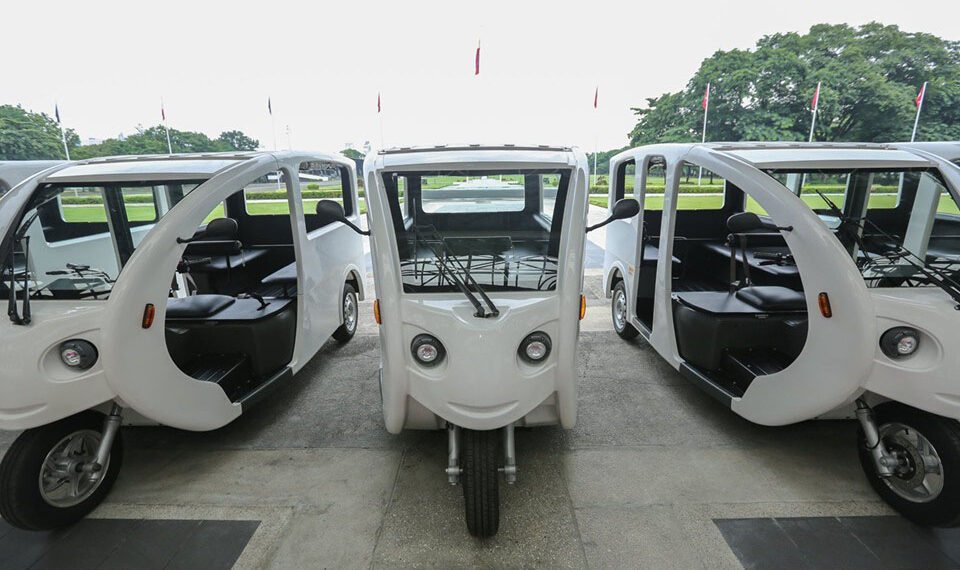The Centre for Extractives and Development Africa (CEDA) has launched a pioneering 22-month research initiative aimed at exploring Ghana’s transition pathways to electric two- and three-wheelers, commonly known as ‘Okada and Pragyia’.
Speaking at the launch, Samuel Bekoe, Executive Director of CEDA, emphasized the strategic importance of transforming Ghana’s transport sector as part of the country’s broader decarbonisation agenda.
“We are looking at how to transition our two- and three-wheelers—simply put, Okada and tricycles—into electric vehicles.
“These modes of transport have become dominant in urban centres like Accra and Kumasi and in rural areas, where they often serve as the only viable means of transportation.”
Samuel Bekoe, Executive Director of CEDA
The project, inaugurated on Thursday, April 24, 2025, is supported by the Climate Compatible Growth (CCG) programme and the United Kingdom’s Foreign, Commonwealth, and Development Office (FCDO).

Ghana’s transport sector accounted for 38% of energy-related greenhouse gas (GHG) emissions in 2021, representing a 14% increase since 2015.
Despite their widespread utility, these vehicles significantly contribute to carbon emissions, and their transition to electric mobility remains largely unregulated, according to Bekoe. The research initiative aims to provide actionable solutions to address this gap.
The project will centre around three main areas: developing a regulatory framework, establishing the necessary infrastructure (such as battery-swapping hubs and charging stations), and identifying incentive structures to attract private sector investment.
“Our research is focusing on robust legislation to regulate the sector, the infrastructure required for this transition, and the incentives needed to attract private investment.”
Samuel Bekoe, Executive Director of CEDA
He further revealed that Ghana’s long-term net-zero target by 2070 will demand a total investment of $550 billion, with around 70% of that required just to transform the transport sector.
Okadas’ Effectiveness

Bekoe emphasized that electric Okadas and tricycles offer a faster and more cost-effective route to transport electrification than electric cars, especially for underserved rural and peri-urban areas where cost and access are major barriers.
“Using life-cycle cost analysis, we aim to show that even though electric motorbikes may have a higher upfront cost, their long-term savings on fuel and maintenance make them more economical over time.”
Samuel Bekoe, Executive Director of CEDA
The project will not only examine economic feasibility but also conduct regulatory and climate impact assessments.
A significant component of the study will include a comparative analysis of fuel-powered versus electric two- and three-wheelers, factoring in environmental and social outcomes.
Beyond environmental benefits, the initiative will assess the socio-economic impact of a shift toward electric mobility.
The research will explore local manufacturing potential and job creation opportunities that could arise from increased demand for electric vehicle components.
Moreover, the project will examine gender dynamics in the use of Okadas and tricycles, aiming to support inclusive mobility strategies that ensure equitable access for women and other marginalized groups.
“We’re not just thinking about emissions. We’re thinking about livelihoods, access, and economic empowerment.”
Samuel Bekoe, Executive Director of CEDA
At the conclusion of the 22-month period, the project aims to deliver a comprehensive policy roadmap to the government.
The roadmap will include recommendations to inform national and local regulations, public-private partnerships, and infrastructure planning.
It will also serve to support the goals outlined in Ghana’s National Energy Transition Framework.
“By transitioning this segment of our transport system, we not only reduce our emissions and pollution levels but also position Ghana as a regional leader in electric mobility.”
Samuel Bekoe, Executive Director of CEDA
With growing urban congestion, rising fuel costs, and increasing climate vulnerabilities, Ghana’s shift toward electric Okadas and tricycles may well serve as a model for other African countries facing similar challenges.
This research initiative, backed by international expertise and local insight, could be a defining step toward a cleaner, more inclusive transport future.





















